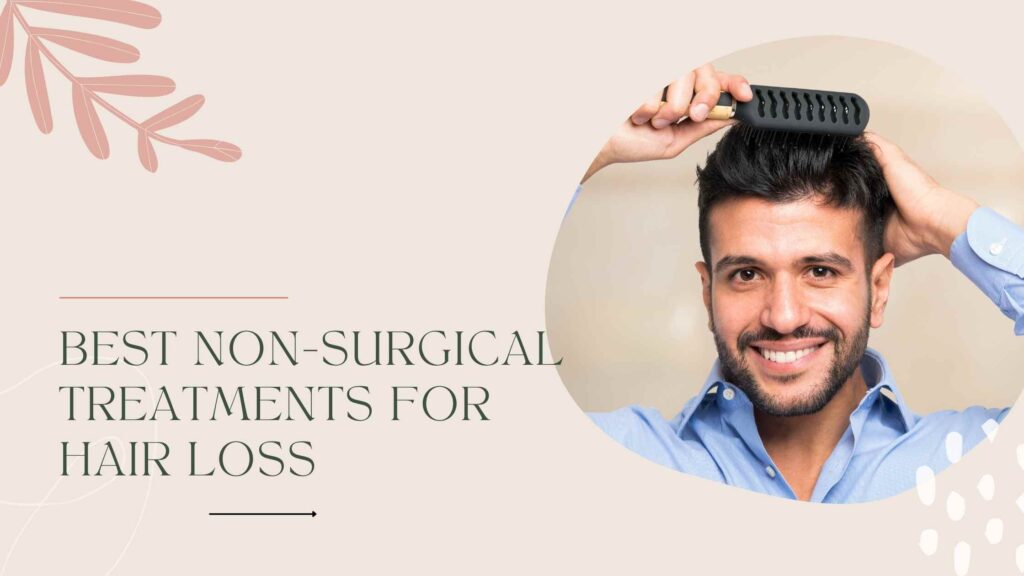Is there a connection between thyroid and hair loss?
Thyroid disorders occur when the thyroid gland in our body fails to act ‘normally’. It either produces too much or too little of certain types of hormones. Now, there are two kinds of thyroid disorders: hypothyroidism or hyperthyroidism. Hypothyroidism takes place when the thyroid gland is underactive. The symptoms of the hypothyroidism condition include fatigue and weight gain. Hyperthyroidism takes place when the thyroid gland is overactive. In this situation, symptoms include nervousness and weight loss. It is essential to note in this regard that symptoms of thyroid disorders take a considerable time to manifest glaringly enough for you to understand. However, when the body suffers thorough thyroid disorder, the hair becomes thin, brittle, and dry. As a consequence, one experiences a lot of hair fall.
Book Appointment for PRP Hair Loss Treatment in Hyderabad
Common Hair Fall Issues due to Thyroid Disorder
As previously mentioned, when the thyroid glands stop working adequately, the body experiences many symptoms. The standard thyroid conditions include:
- Weight gain
- Fatigue
- Nervousness
- Weight loss
These common conditions also include hair loss. When T3 and T4 hormones get disrupted, hair loss takes place. The issue of hair loss is more apparent when thyroid disorders are untreated or extreme. As the hair becomes thin, brittle and dry due to thyroid disorder, it is crucial to understand the hair fall issue caused by thyroid disorders.
Hair Loss caused by Thyroid
To understand how Thyroid causes hair loss, we must first understand how the hair grows.
- Hair grows at the root on the scalp, at the bottom of the hair follicle.
- The blood vessels of the scalp supply food to the root of the hair. The food enhances the growth of more cells, making the hair grow.
- As the hair grows, it pushes up through the skin of the scalp. When coming up, it passes the oil glands of the scalp. These oil glands keep the hair shiny and soft.
- The growth of the hair takes place for a while. When it breaks and falls, the cycle of new growth begins.
Read more about How to Grow Hair Faster?
We can surmise that hair loss is average but what is not normal is the disruption of the hair growth’s new cycle. The disturbance in the T3 and T4 can disturb the hair growth’s standard process. In that situation, the hair falls as before and perhaps more, but the new growth does not take place. Hence, one experiences thin hair more and more. The hair may fall out either in strands or in clumps. It depends on the severity of the thyroid disorder and how the treatment is going. However, hair loss is not just on your scalp. You may notice thinning eyebrows, eyelashes, and on your body. Hair loss usually does not occur in or from one particular region alone. Hence, you may not notice it at first.
Signs & Symptoms of Thyroid induced Hair Loss
There are a few signs and symptoms that you need to look out for to understand that the hair loss is taking place due to thyroid disorder:
- Hair fall is normal but losing 100 strands a day is not. If you see too much hair loss throughout the day, you may not expect such things.
- Suppose you see much hair loss when showering or brushing your hair. It is to be noted here, even if the hair does not come out in clumps, you should not ignore it.
- You experience thinning eyelashes, eyebrows and body hair.
- The hair is thin and sparse across the scalp.
- A hair loss condition associated with thyroid disorder is alopecia. It is an autoimmune condition when one experiences patches of hair loss in distinct and noticeable areas of the scalp. It may also cause baldness after some time.
Possible course of action
The first and foremost action should be to consult with the doctor and get the thyroid test done. If you notice thinning hair with significant hair loss throughout the day, you should not ignore it. The doctor will get the thyroid test done and let you know the stage of thyroid disorder you are in. If the thyroid disorder’s condition is mild, it will not necessarily worsen the condition of your hair. If you follow up closely with the doctor and adhere to the medications and advice given to you, your hair may grow back to become thicker along with the proper functioning of the hair growth cycle. However, you may want to note that the hair growth process will not be immediate. It will take time but will work, and you need to keep patience.
Steps to combat Thyroid related hair loss
To stop losing hair due to Thyroid, you may want to follow the following course of action:
- Consult a doctor and get a thyroid test done
- The doctor will determine the extent of your suffering and prescribe the drugs that will suit your condition.
- The most commonly prescribed drugs doctors prescribe to treat thyroid disorders are:
- If you are suffering from hyperthyroidism, your doctor may prescribe propylthiouracil and methimazole
- Your doctor may also give beta-blockers to treat hyperthyroidism.
- If you are suffering from hypothyroidism, your doctor may prescribe levothyroxine.
The doctor will closely monitor the process of your hair growth and the overall reaction of your body towards the prescribed medicines. If the doctor feels so, surgery may also be an option.
Before and After Situation
The before is thin, sparse, and patchy hair on the scalp and other areas. But with treatment, hair growth will take place. However, while it is true that one does not notice hair growth for several months of treatment, the hair that grows back will be different in color and texture from before.
Thus, notice your hair loss pattern and seek medical help when required.
